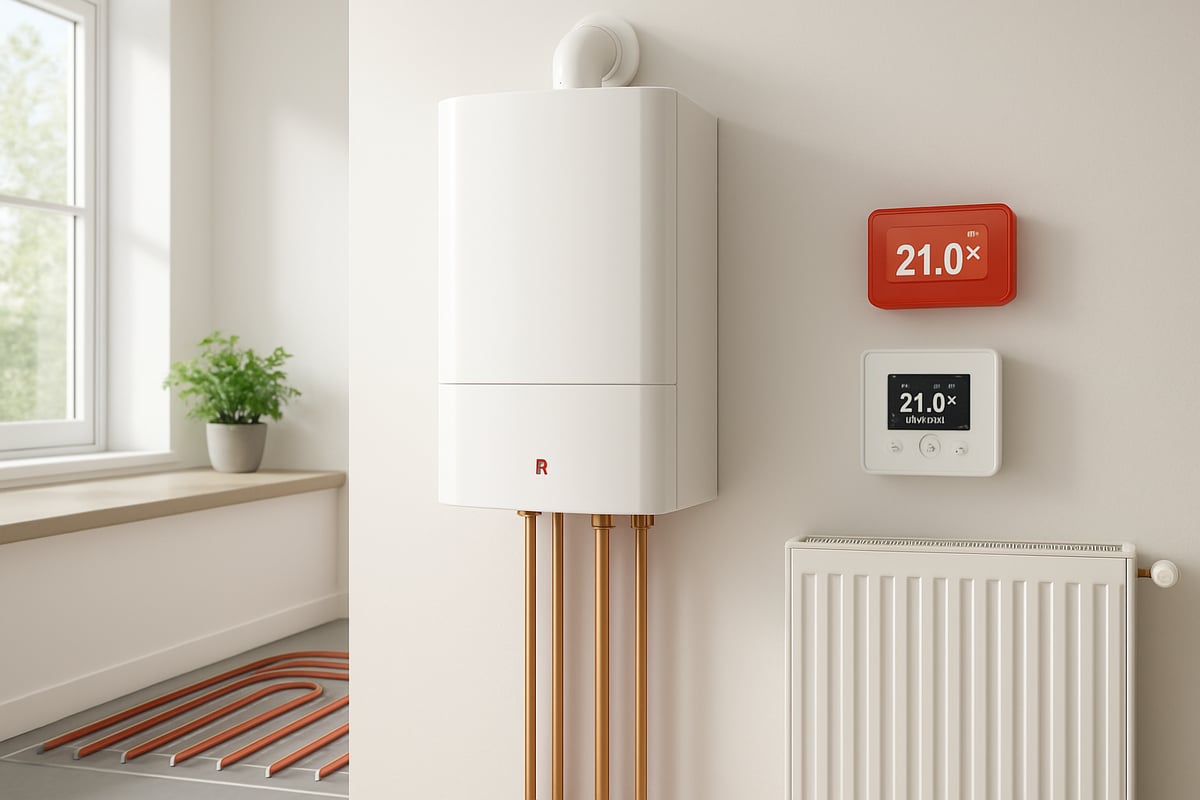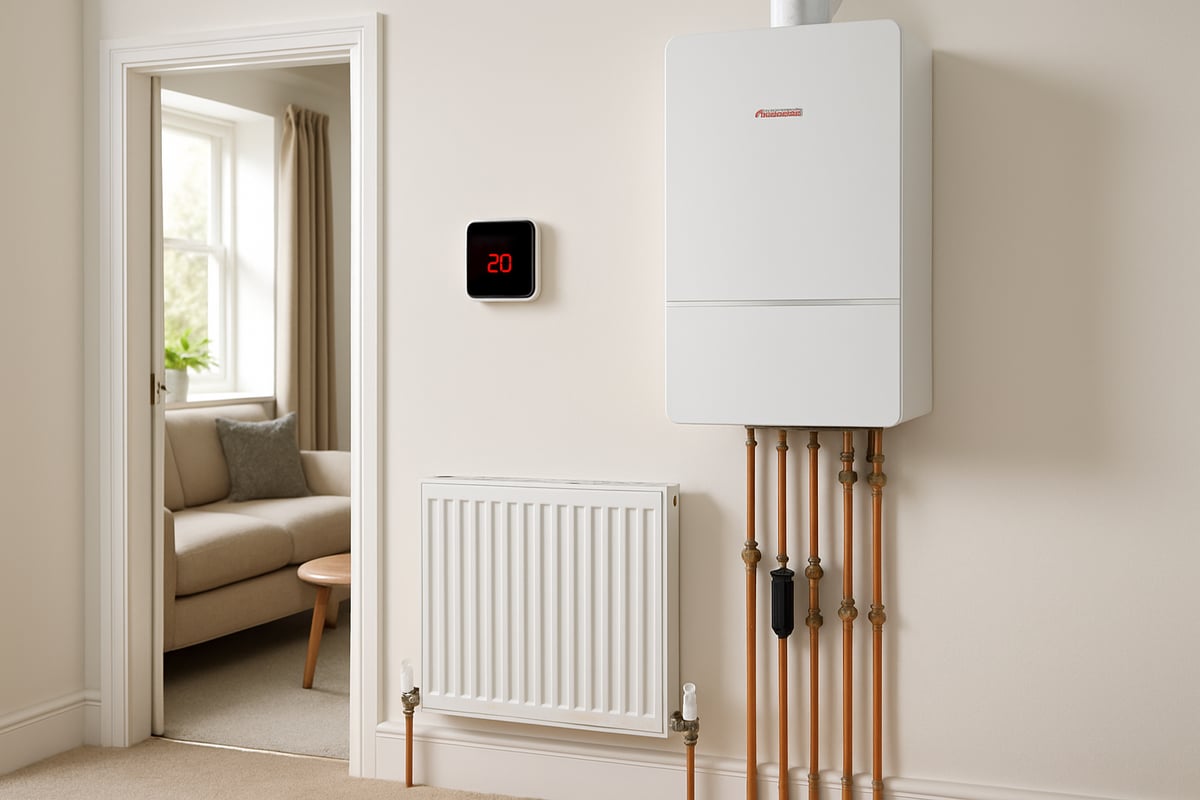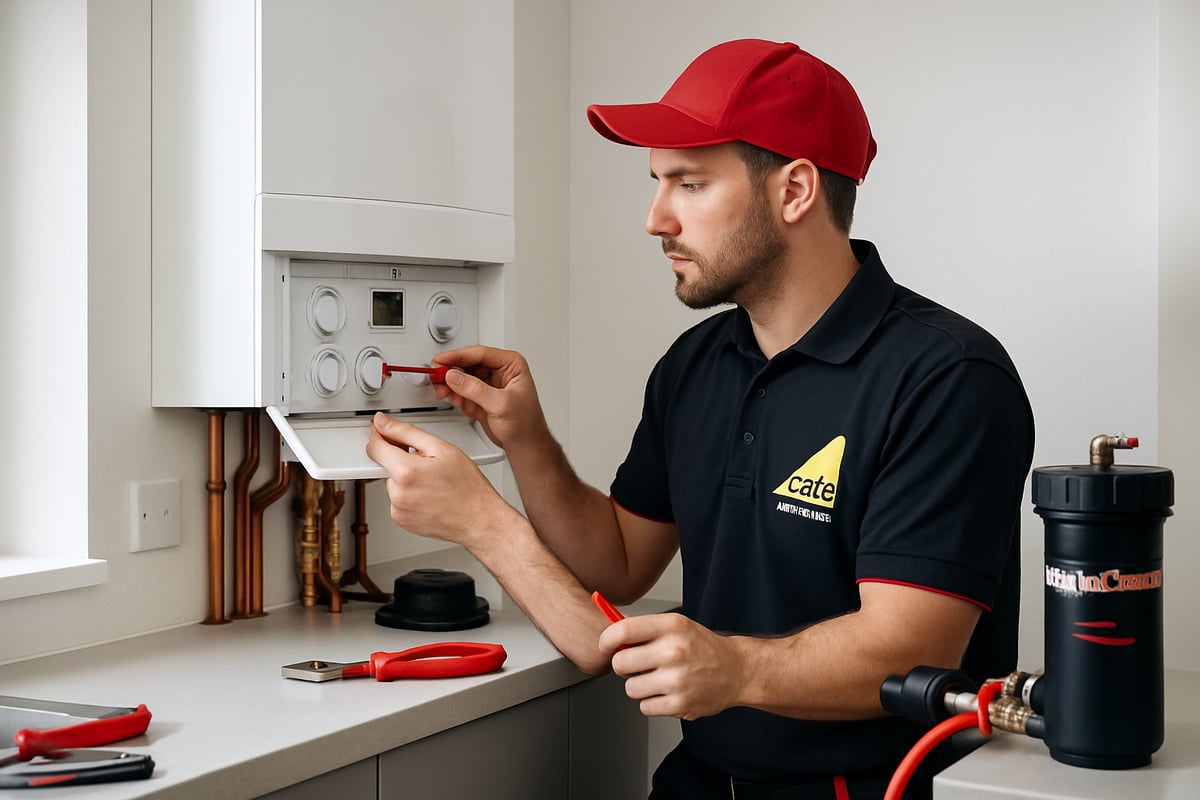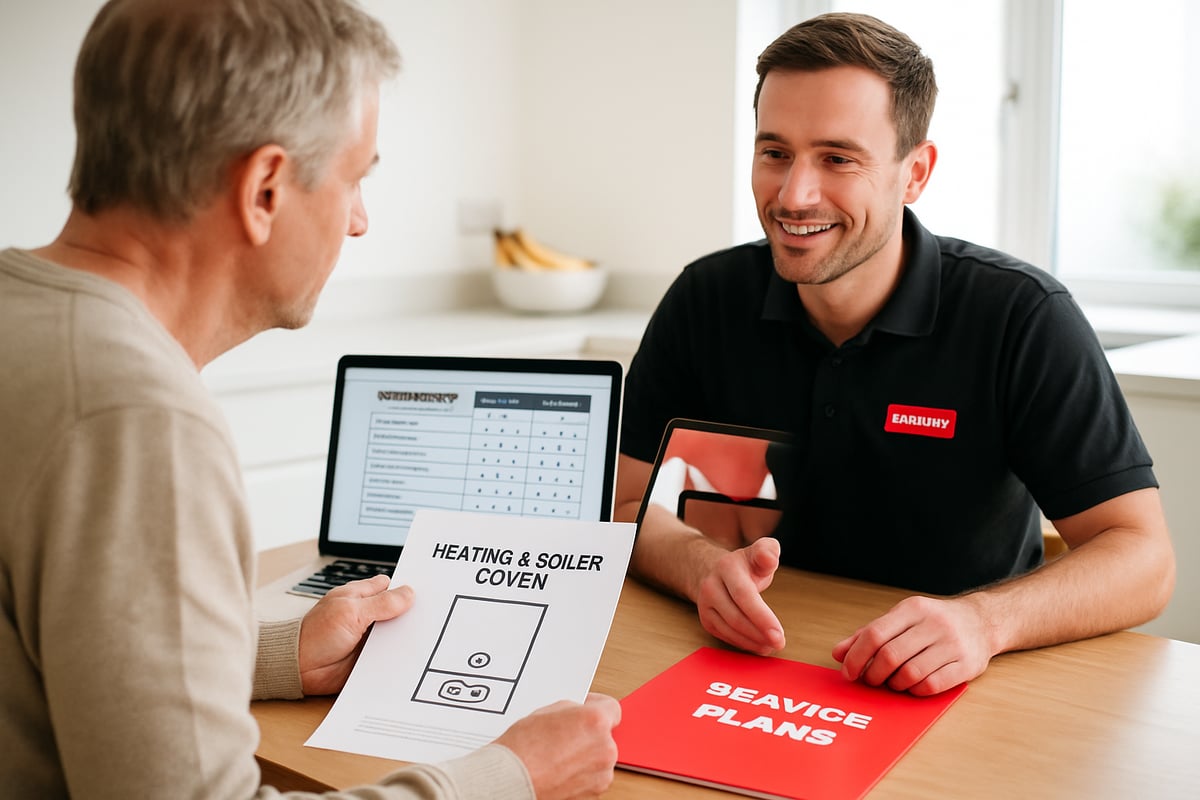Heating and Boiler Guide: Essential Tips for 2025
Did you know that efficient heating and boiler systems are now more crucial than ever for UK homeowners? With energy prices climbing and new regulations arriving in 2025, staying warm and saving money has become a real challenge.
Many households still rely on outdated heating and boiler setups that are prone to sudden breakdowns. This not only impacts comfort but can also send energy bills soaring when you least expect it.
Understanding your heating and boiler options, keeping up with regular maintenance, and exploring smart upgrades can make all the difference. The right approach leads to cost savings, energy efficiency, and peace of mind.
This guide brings you essential tips, expert insights, and the latest guidance for keeping your heating and boiler running smoothly in 2025. We’ll cover boiler types, energy efficiency tricks, maintenance musts, choosing the right cover, smart controls, and what the future holds.
Understanding Modern Boilers and Heating Systems
Modern UK homes rely on advanced heating and boiler solutions to stay warm, comfortable, and energy efficient. As we approach 2025, rapid changes in technology and regulations are shaping the way we heat our homes. Understanding these systems is essential for making smart choices, reducing bills, and complying with upcoming standards.

Types of Boilers in 2025
When it comes to heating and boiler choices in 2025, homeowners have several options. The three main types are combi, system, and regular boilers. Combi boilers provide heating and hot water on demand, making them ideal for flats and smaller houses. System boilers require a hot water cylinder, suiting larger homes with higher water needs. Regular, or conventional, boilers work with tanks and are often chosen for properties with existing traditional setups.
Advancements in condensing technology now ensure that almost all new boilers are highly efficient, capturing more heat from exhaust gases. The table below summarises the main differences:
| Boiler Type | Best For | Pros | Cons |
|---|---|---|---|
| Combi | Small homes | Compact, no tanks, instant hot water | Limited to one shower at once |
| System | Medium-large homes | Good for multiple bathrooms | Needs cylinder space |
| Regular | Large/traditional | Works with old systems | Requires loft space/tanks |
Alternative fuels are also gaining ground. Many new boilers are LPG, electric, or hydrogen-ready, with hydrogen-ready models particularly important for future-proofing against gas bans. According to recent figures, over 80% of new UK boiler installations are now highly efficient condensing models.
Government rules are evolving fast. The Gas Boiler Regulations 2025 highlight the push for hydrogen-ready appliances and stricter efficiency standards. Homeowners need to keep these changes in mind when planning any heating and boiler upgrades.
Key Components of a Central Heating System
A domestic heating and boiler setup relies on several key elements working in harmony. The main components include:
- Boiler (the heat source)
- Radiators or underfloor heating (heat emitters)
- Pipework (for hot water circulation)
- Thermostats and smart controls
- Expansion vessels and pumps
Having compatible, modern components is vital for energy savings. For example, installing a new condensing boiler with old, sludged radiators can reduce the system's overall efficiency. Outdated thermostats or lack of zoning can also lead to uneven heating, cold spots, and higher bills.
Smart thermostats have become increasingly common, allowing homeowners to control temperatures in different rooms and set schedules. Underfloor heating is often integrated with new systems, providing even warmth and working well with efficient boilers. However, mismatched or neglected parts are a frequent source of performance issues in heating and boiler systems.
Latest Heating Technologies and Innovations
Heating and boiler technology is advancing rapidly, with smart controls and automation transforming home comfort. Smart thermostats and connected systems let you manage heating remotely, learn your routines, and optimise energy use. Many households are installing hydrogen-ready or hybrid heating systems, which combine traditional boilers with heat pumps or renewable sources to reduce carbon footprints.
Weather compensation and load compensation controls are new features that adjust boiler output based on outdoor temperatures and actual demand. This means your home stays comfortable while using less energy. For example, families using smart heating controls have reported up to 20% lower energy bills.
Data shows that over half of UK homes are expected to adopt some form of smart heating tech by 2025. Government incentives, including grants and tax breaks, are encouraging the switch to low-carbon solutions. As innovation continues, heating and boiler systems are becoming more sustainable, reliable, and tailored to individual needs.
The future of heating and boiler technology lies in combining efficiency, automation, and eco-friendly options. Staying informed and embracing new solutions will help you save money and stay ahead of regulatory changes.
Energy Efficiency and Cost-Saving Tips for 2025
Keeping your home warm and your bills under control is more important than ever as we approach 2025. With energy prices fluctuating and new regulations shaping the industry, making your heating and boiler system as efficient as possible is key to saving money and reducing your carbon footprint.

Improving Boiler Efficiency
Regular maintenance is the first line of defence for any heating and boiler system. Annual servicing by a qualified engineer ensures your boiler runs smoothly, cuts down on breakdown risks, and keeps it operating at peak efficiency. Cleaning internal components and checking for leaks or corrosion can prevent minor issues from escalating into expensive repairs.
Bleeding radiators and checking system pressure are simple tasks that boost efficiency. Upgrading to an A-rated boiler or installing modern controls can make a dramatic difference, especially if you’re replacing an old G-rated unit. For example, switching to a new condensing boiler can save up to 30% on energy bills, while annual servicing alone may improve efficiency by up to 15%.
Ignoring boiler inefficiency can lead to higher energy bills and increased carbon emissions. By focusing on these essential steps, your heating and boiler system will be ready for the demands of 2025, helping you stay comfortable and cost-effective.
Reducing Heating Costs
Smart use of your heating and boiler system can quickly add up to significant savings. Setting your thermostat and timer to match your daily routine ensures you only use heat when you need it. Dropping your thermostat by just 1°C can cut heating bills by up to 10%—a small change with a big impact.
Insulating your pipes, walls, and loft keeps the heat where it belongs, reducing the workload on your heating and boiler. Simple additions like radiator reflectors and thermostatic radiator valves further optimise comfort and efficiency. The average UK household spends over £1,200 a year on heating, but investing in insulation and smarter controls can trim that figure substantially.
The long-term value of these improvements means you’ll not only save money, but you’ll also extend the life of your heating and boiler system, making your home more resilient to future price rises.
Eco-Friendly Heating Solutions
Looking ahead to 2025, eco-friendly upgrades are at the heart of future-proofing your heating and boiler setup. Heat pumps, solar thermal panels, and hybrid systems are becoming increasingly popular as alternatives to traditional gas boilers. Each option comes with its own pros and cons—heat pumps excel in well-insulated homes, while hybrid systems combine the reliability of a boiler with the efficiency of renewable energy.
Government incentives such as the Boiler Upgrade Scheme make switching to greener technologies more affordable. For example, many households in Kent have already taken advantage of grants to install air source heat pumps, reducing both their bills and their carbon footprint. In 2024–2025, uptake of renewable heating solutions is expected to rise sharply as the UK prepares for future bans on fossil fuel boilers.
If you’re considering an upgrade, it’s worth reading guidance like How to choose an eco-friendly boiler for tips on selecting the best system for your needs. By embracing these innovations, you’ll be ahead of the curve—ready for new regulations and enjoying a home that’s both comfortable and sustainable.
Essential Boiler Maintenance and Troubleshooting
Keeping your heating and boiler system in peak condition is crucial for comfort and efficiency in 2025. Regular attention helps prevent costly breakdowns and ensures your home stays warm when you need it most. With new technologies and stricter standards, understanding maintenance and troubleshooting can save you money and stress.

Routine Maintenance Steps
Routine maintenance is the foundation of a reliable heating and boiler setup. Scheduling an annual service with a Gas Safe registered engineer is essential. These professionals inspect for leaks, corrosion, and unusual noises—common signs that something’s amiss.
A thorough check should include:
- Inspecting the boiler casing and pipework for leaks
- Testing pressure and bleeding radiators for air pockets
- Ensuring all controls and thermostats function correctly
System flushing is another key maintenance step. Over time, sludge and debris can build up, reducing efficiency. Many homeowners now opt for a powerflush to keep water flowing freely. For a more advanced solution, consider the MagnaCleanse system flushing benefits, which targets stubborn deposits and extends boiler life.
DIY checks, like monitoring pressure and topping up when needed, can help. However, complex issues should always be handled by a professional to avoid voiding warranties or causing damage. A well-maintained heating and boiler system not only runs more efficiently but also keeps energy bills under control.
Recognising and Solving Common Boiler Problems
Spotting issues early is vital for your heating and boiler system’s longevity. Low pressure is a frequent concern, often caused by bleeding radiators or minor leaks. If you notice cold radiators, check for trapped air or faulty valves.
Pilot light failures and error codes are common in modern boilers. Many error codes are explained in the manual, guiding you to quick fixes. For example, if your boiler isn’t heating water, resetting it might solve the problem. If the issue persists, call an engineer.
Common problems include:
- No heating or hot water
- Strange noises (banging, gurgling)
- Leaking pipes
According to recent surveys, boiler breakdowns are among the top reasons for emergency callouts in UK homes. Ignoring early warning signs can lead to more significant failures and higher repair costs. Regularly checking your heating and boiler setup helps you act before minor issues escalate.
The Importance of Professional Support
Relying on professional support for your heating and boiler system is crucial for safety and compliance. Gas Safe registered engineers have the expertise to spot hidden problems, carry out thorough health checks, and ensure your system meets legal standards.
Many homeowners choose service plans for peace of mind. These plans often include annual servicing, unlimited claims, and even repair guarantees—making them a smart investment. Emergency repair services are also invaluable, offering rapid response times when things go wrong.
Customer reviews consistently highlight the value of professional support, with satisfaction ratings often above 4.5 out of 5. Balancing DIY maintenance with expert help keeps your heating and boiler system running smoothly, reduces risks, and ensures you’re covered in an emergency. Ultimately, professional care means fewer surprises and more reliable warmth throughout the year.
Choosing the Right Boiler Cover and Service Plan
Navigating the world of heating and boiler cover can feel overwhelming, especially with so many options in the market. The right policy can safeguard your home against unexpected breakdowns and costly repairs, offering peace of mind. As you consider your options for 2025, understanding what’s included, how to compare providers, and whether cover is worth it is essential.

What Boiler Cover Includes
Boiler cover policies are designed to protect your heating and boiler system against unexpected failures. Most plans include repairs to the boiler itself and may extend to your central heating, plumbing, electrics, and even drains.
There are typically two main types of cover:
- Basic boiler cover: Protects just the boiler and its controls.
- Comprehensive cover: Includes the entire heating and boiler system, central heating, and sometimes extras like plumbing or electrics.
For example, HomeServe offers tiered cover options, with the most comprehensive plans covering everything from boiler breakdowns to annual servicing and unlimited claims. Here’s a quick comparison:
| Cover Type | What’s Included | Typical Monthly Cost |
|---|---|---|
| Boiler Only | Boiler and controls | £8–£12 |
| Central Heating | Boiler, radiators, pipework | £12–£18 |
| Full Home Emergency | Boiler, heating, plumbing, electrics | £18–£25 |
Annual boiler servicing is often included in top-tier plans, helping to keep your heating and boiler running efficiently and safely throughout the year.
How to Compare Boiler Cover Providers
When comparing heating and boiler cover, it’s important to look beyond the monthly price. Key factors to weigh include:
- Excess: The amount you pay towards each claim.
- Claim limits: The maximum payout per claim or annually.
- Response times: How quickly an engineer can attend.
- Exclusions: What’s not covered, such as pre-existing faults.
Nationwide engineer networks and 24/7 customer support can make a big difference in getting fast help when you need it. For instance, HomeServe’s free boiler service and replacement guarantee set them apart from some competitors.
Always check the number of claims allowed per year and the maximum payout limits. Reading customer reviews and checking Trustpilot scores gives a real-world view of reliability and service quality. Taking the time to compare these details ensures your heating and boiler stay protected and you get true value from your policy.
Is Boiler Cover Worth It?
Deciding whether to invest in heating and boiler cover depends on your personal circumstances. If your boiler is older or you rely heavily on your heating and boiler system, the risk of unexpected breakdowns is higher. Cover can save you hundreds of pounds on major repairs or emergency callouts.
Consider these scenarios:
- Homeowners: A major breakdown could cost £300–£700 without cover, but with a policy, you pay only the excess.
- Landlords: Cover ensures tenants’ comfort and helps meet legal responsibilities.
- Tenants: Some policies are available if you’re responsible for your own heating and boiler.
Here’s a quick comparison of average repair costs:
| Repair Type | With Cover (Excess) | Without Cover |
|---|---|---|
| Minor Repair | £0–£60 | £90–£150 |
| Major Breakdown | £0–£60 | £300–£700 |
| Annual Service | Included | £80–£120 |
Comprehensive plans deliver the most value to those with older systems or who want peace of mind. Alternatives include self-insuring—setting aside money for repairs—or pay-as-you-go services. However, for many, the convenience, reliability, and support from a cover plan make it a smart investment in the ongoing health of your heating and boiler.
Smart Controls and Home Heating Automation
Smart controls are transforming the way UK households manage their heating and boiler systems. With rising energy costs and a focus on convenience, more people are looking for smarter ways to stay warm while saving money. These advanced solutions allow you to control your home’s temperature from anywhere, ensuring comfort and efficiency at all times.
Introduction to Smart Heating Controls
Smart thermostats and connected heating systems are quickly becoming essential tools for managing heating and boiler performance. These devices let you adjust temperatures remotely, set detailed schedules, and monitor energy use in real time. Most modern boilers are fully compatible with smart controls, making upgrades straightforward for many homes.
Popular brands offer features such as learning your routine, providing energy reports, and integrating with voice assistants. According to recent surveys, nearly 40% of UK homes now use some form of smart heating technology. This shift is helping households take control of their heating and boiler costs, while also offering greater comfort.
The main benefit? You can manage your system on the go, ensuring your home is warm when you need it and saving money when you don’t.
Setting Up and Using Smart Controls
Getting started with smart controls for your heating and boiler system is easier than you might think. Installation typically involves connecting the thermostat to your Wi-Fi and linking it to your boiler’s control panel. Many systems come with step-by-step guides, and some even offer professional installation for extra peace of mind.
After setup, you can use mobile apps to adjust settings, create heating schedules, and even control individual rooms if your system supports zoning. Voice assistants like Alexa and Google Assistant make it simple to change the temperature with a quick command. For example, families can set custom routines for weekdays and weekends, ensuring each room is only heated when in use.
Smart scheduling has been shown to reduce energy bills by up to 10%, especially when used consistently. If you want to learn more about the benefits of installing a smart thermostat, check out our detailed guide for practical tips and real-world savings.
These tools are designed to be user-friendly, making them accessible for everyone—from busy parents to older residents who appreciate the simplicity of automated comfort.
Maximising Efficiency with Automation
Automation takes heating and boiler management to the next level. Features like geofencing use your phone’s location to adjust heating automatically when you leave or return home. Occupancy sensors detect when rooms are in use, ensuring energy isn’t wasted on empty spaces.
Some smart controls also link to local weather forecasts, adjusting your heating in response to sudden temperature drops or milder days. Households that embrace these innovations have reported up to 15% reductions in heating costs, all while enjoying greater comfort.
Looking ahead, AI-driven systems will analyse your habits and optimise your heating and boiler setup for even more savings. The future of home heating is not just smart—it’s intuitive, helping you stay ahead of rising costs and changing regulations.
Future Trends in Heating and Boiler Technology
The heating and boiler landscape in the UK is changing rapidly as we approach 2025. Homeowners face new regulations, cutting-edge technologies, and a growing need to future-proof their properties. Staying informed about these trends is essential for making smart decisions that will keep your home warm, efficient, and compliant in the years ahead.
Upcoming Regulations and Industry Changes
2025 is a pivotal year for heating and boiler regulations in the UK. The government is tightening rules on energy efficiency and emissions, pushing homeowners and installers to adopt more sustainable solutions. Traditional gas boilers are facing stricter standards, and new installations must comply with the latest Boiler Plus requirements.
Hydrogen-ready boilers are gaining traction as a future-proof choice, preparing homes for a potential switch to hydrogen fuel as part of the national decarbonisation plan. Key milestones include proposed phase-outs of fossil fuel boilers in new builds and increased support for low-carbon technologies. For a detailed look at the upcoming standards, check out the Boiler Plus 2025 Guide, which outlines the latest efficiency requirements and what they mean for your next heating and boiler upgrade.
Innovations to Watch
Technology is transforming the heating and boiler sector. Smart self-diagnosing boilers are emerging, capable of predicting faults before they cause breakdowns. These systems can send alerts directly to your phone or service provider, reducing downtime and repair costs.
Integration with whole-home energy systems is another trend to watch. Boilers, heat pumps, and even solar panels can now work together, managed by intelligent controls that optimise performance and lower bills. Early adopters are already benefiting from hybrid and hydrogen-ready systems, which combine traditional reliability with future-ready features.
The UK is seeing a surge in renewable heating installations, with government incentives boosting uptake. According to industry forecasts, the share of homes using low-carbon heating could double by 2025. These innovations are reshaping what homeowners expect from their heating and boiler setup, making comfort and sustainability go hand in hand.
Preparing Your Home for the Future
Now is the perfect time to future-proof your heating and boiler system. Start by assessing your current setup—are your boiler and controls compatible with the latest technologies? If not, consider modular or scalable solutions that can adapt as regulations and fuels change.
Upgrading to a hydrogen-ready or hybrid system can make your home more resilient to future policy shifts. Many households are planning improvements, with surveys suggesting up to 40% intend to upgrade by 2025. Take advantage of government support, such as grants through the Boiler Upgrade Scheme Regulations 2022, to offset the cost of switching to low-carbon technologies.
Staying informed and proactive ensures your heating and boiler system stays efficient, legal, and future-ready. Explore trusted resources, consult experts, and join the movement towards a greener, smarter home.
If you’re feeling overwhelmed by all the changes coming to heating and boilers in 2025, you’re definitely not alone. We’ve covered everything from choosing the right system to boosting efficiency and staying prepared for the latest regulations, but sometimes you just need a bit of expert advice tailored to your home. That’s where we can help—Castle Heating Kent’s friendly, Gas Safe registered team is always happy to chat about your options or tackle any heating worries. If you’ve got questions or want to book a service, just Call Now on 01634790511 or 0800 0016511—we’re here for you in Kent, Rochester, and Gravesend.

